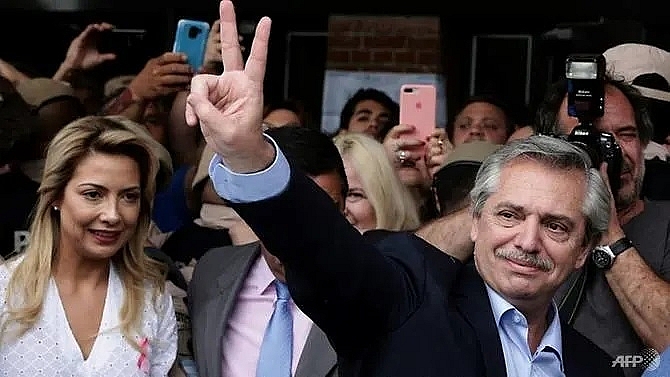Argentina's president-elect rejects remaining IMF money
 |
| Peronist Alberto Fernandez was chosen as Argentina's next president in the country's general election on Oct 27, 2019. (AFP/Alejandro PAGNI) |
Outgoing centre-right President Mauricio Macri agreed a massive US$57 billion loan loan package last year, but the austerity measures he imposed failed to right the economy.
"What I want is to stop asking (for money), and that they let me pay," said Fernandez, who takes office on December 10 after ousting Macri in last month's elections.
"I have an enormous problem. And I'm going to ask for US$11 billion more?" the incoming president said in an interview Argentina's Radio Con Vos.
Fernandez said he will "try to revive the economy in order to pay and solve the debt problem sensibly."
The return to power of protectionist Peronists has raised fears of yet another debt default, and eroded the peso's value.
The poverty rate has risen to more than 35 per cent, inflation for the year to September was at almost 38 percent, while the peso has depreciated 70 per cent since January 2018.
'A LITTLE DRUNK'
The president-elect has insisted his government would not default but rather seek to renegotiate the terms of the IMF loan, and sought to reassure voters in last month's election that their bank deposits would be safe under his administration.
"It's like a guy who drinks a lot and is a little drunk. The solution is not to continue drinking. The solution is to stop drinking," he told the radio.
Debt soared by about US$100 billion under Macri and now exceeds 90 per cent of GDP. At the time of his election in 2017, it was 38 per cent of GDP.
"I try to be a serious person. A person who tells you 'I'm going to do such and such a thing,' and you know he's going to do it.
"I don't want to sign agreements that I'm not going to fulfill. Those agreements were already signed by Macri. He signed one, two, three and fulfilled none," said Fernandez.
The IMF suspended the release of a US$5.4 billion disbursement in September following the government's failure to meet inflation targets.
"We want them not to lend us more money, but to let us develop. Let's discuss the time I need to develop, but don't give me more money."
Debt soared by about US$100 billion under Macri and now exceeds 90 per cent of GDP. At the time of his election in 2015, it was 38 per cent of GDP.
What the stars mean:
★ Poor ★ ★ Promising ★★★ Good ★★★★ Very good ★★★★★ Exceptional
Related Contents
Latest News
More News
- Russian President congratulates Vietnamese Party leader during phone talks (January 25, 2026 | 09:58)
- Worldwide congratulations underscore confidence in Vietnam’s 14th Party Congress (January 23, 2026 | 09:02)
- Political parties, organisations, int’l friends send congratulations to 14th National Party Congress (January 22, 2026 | 09:33)
- 14th National Party Congress: Japanese media highlight Vietnam’s growth targets (January 21, 2026 | 09:46)
- 14th National Party Congress: Driving force for Vietnam to continue renewal, innovation, breakthroughs (January 21, 2026 | 09:42)
- Vietnam remains spiritual support for progressive forces: Colombian party leader (January 21, 2026 | 08:00)
- Int'l media provides large coverage of 14th National Party Congress's first working day (January 20, 2026 | 09:09)
- Vietnamese firms win top honours at ASEAN Digital Awards (January 16, 2026 | 16:45)
- ASEAN Digital Ministers' Meeting opens in Hanoi (January 15, 2026 | 15:33)
- ASEAN economies move up the global chip value chain (December 09, 2025 | 13:32)

 Tag:
Tag:




















 Mobile Version
Mobile Version